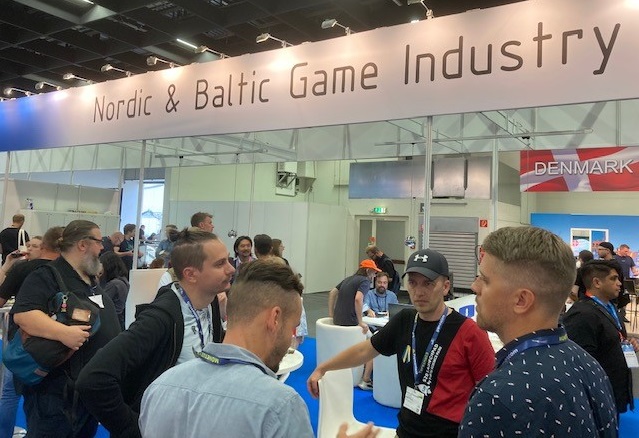The game industry continues to grow – but not by itself
The biggest gaming event in Europe, Gamescom 2022, took place in Cologne in August – after a long break due to the pandemic. Dozens of Finnish companies participated, and there were over ten companies at the Nordic Baltic stand as well. We from Business Finland were also present. Even more companies participated than pre-Covid-19, but fewer booths than usual were open to consumers. This was most likely due to the lower than normal number of AAA games that had been postponed by Covid-19.
As a whole, the atmosphere at Gamescom was positive. The Covid-19 lockdown boosted the growth of the game industry, and despite the change in consumers' use of time when the Covid-19 restrictions eased, the global gaming market and the number of players continues to grow steadily. Remote work has also been a natural change for gaming professionals.
What's going on?
This year, the global game industry will not yet break the magic $200 billion limit, but it is getting closer. The growth will also continue on the mobile gaming side, although Apple's privacy practices were feared to significantly reduce the acquisition of new users. Free-to-play games still dominate, but the marketing of games has become so expensive that it can only be done effectively by the biggest players. The good old PC is making a strong new comeback, as evidenced in particular by the Steam Deck handheld gaming console, which consists of PC hardware and thus combines mobile gaming with PCs. Gaming tools are also more and more used by the audiovisual industry: for example, a lion's share of the effects of the Star Wars Mandalorian series were made with the Unreal Engine. Looking in the direction of gaming, Netflix grabbed the Finnish Next Games as its game studio and at the same time made Helsinki its European gaming capital.
Despite the tough times in the global economy, it seems that the game industry is relying on its proven ability to survive.
The number of players is steadily increasing. However, inflation is undermining purchasing power and, at least in the short term, players may spend less money on individual games. The war in Ukraine has made access to financing more difficult, and companies are expected to cross the valley of death for up to two years before their next funding round.
Asia already represents more than half of the global gaming market and continues to grow further. Latin America, the Middle East, and Africa are also on the rise. The mobile and internet infrastructure in these regions has improved rapidly, and the industry will invest strongly in local gaming services in the coming years. The versatile distribution platforms of the game industry and various charging and earning models also effectively counter the effects of the recession in the short term and offer an opportunity for long-term steady growth.

Systematic long-term support pays off
We are particularly pleased that the net sales of the Finnish game industry exceeded EUR 3 billion for the first time in 2021. The growth was brought not only by large, well-known game companies, but also by startups succeeding in rapid scaling up with whom Business Finland has conducted long-term cooperation. Last year, Business Finland funded the Finnish game industry with around EUR 12 million, and in total, it has already invested around EUR 180 million in the industry's development projects over a little more than 25 years. Professional and program services directed at the industry come on top of this.
The game industry has been the jewel in the crown of Finland's export industry in terms of the public funding allocated for it and its return on investment.
The input-output ratio of the industry, which is based entirely on exports, has been excellent due to its growth, foreign investments, tax revenue from profits, and acquisitions. Finland has the largest game industry in Europe per capita, and it is also among the largest ones in terms of turnover.
This is what Sweden would do
The future challenges of the Finnish game industry lie mainly in attracting enough talent, which may slow down growth significantly. In this respect, all available means and agile methods must be put in place. The number of new startups has also fallen slightly over the past two years. Covid-19 might have played a role in this, but more attention needs to be paid to the emergence of new generations of entrepreneurs, as startups will be the foundation and competitive advantage of the Finnish game industry for a long time to come. Young, fast-growing game companies are urgently needed.
It is also interesting to compare the situation of the Finnish game industry with that of our toughest competitor Sweden in the last few years. In Sweden, the game industry has grown in the same way as in Finland, and the Swedish business environment in terms of competence and gaming ecosystem are very similar to those in Finland. It is interesting, however, that Swedish game companies seek growth through aggressive acquisitions and listing.
In 2020–2021, only a few Swedish companies were acquired abroad, but in Finland almost all acquisitions were made by foreign companies. The acquisitions have been profitable as such, but it would be good to keep a close eye on our western neighbor as well. In Sweden, game company listings are commonplace, and aggressive expansion creates a basis for a long-term competitive advantage while the main owner usually remains in Sweden.
We should ask what we can learn from this. We strongly believe that it is and will be worthwhile to invest even more in the game industry through innovation funding, professional services, and international trade fair participation.
The Finnish game industry has a strong reputation around the world, but it is not yet known widely enough.
It would not be a bad idea to have a booth dedicated entirely to Finland at the next big game fair.
Read more about the funding for game business development
Photo: Kari Korhonen

